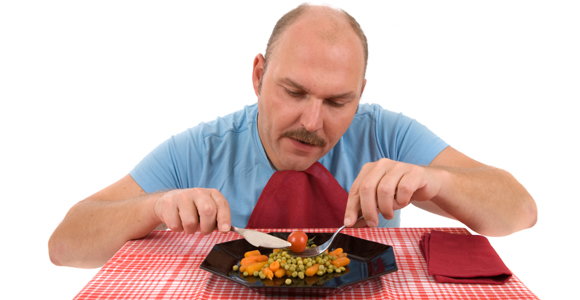Have you ever looked at your plate and thought, where did my meal go? Many people eat so fast that they don't even know they are full until they feel ill, and most can't even describe how the food they just ate tasted.
Stop And Chew The Cauliflower
A recent study in the January 2014 issue of Journal of the Academy of Nutrition and Dietetics found that you might consume fewer calories over the course of a meal when you eat slowly. What made this study unique was that it separated subjects into two groups: "normal weight" and overweight/obese, then compared their caloric intake with speed of eating. Guess what they found out? Both groups consumed fewer calories during the meal when they ate slowly, but for the normal weight group, the difference was greater. Other studies have shown that "normal weight" individuals tend to take more chews per bite than those who are overweight or obese.
How Does It Work?
You might be wondering how eating slower might prevent you from overeating. Eating too fast throws off your natural signaling process, which involves hormones and communication between your gut and brain. Ghrelin, or the "hunger hormone," is produced in your stomach and acts on your brain's pleasure centers, making you reach for more food because it tastes great. But we also have another hormone, leptin, that suppresses hunger and helps keep you from overeating. Most agree that it takes about 20 minutes for your brain to tell your body that it has had enough. If you eat too fast, your body doesn't get the message until it's too late, and you are looking at an empty box of cookies.
The Chew Factor
Digestion begins in your mouth and chewing breaks down your food, which makes it easier for your intestines to absorb the nutrients. Chewing too fast robs your body of good nutrition. Wondering how many chews you should have per bite? Most studies show the magic number to be between 30 and 40 chews.
Zen Eating
By slowing down your eating and increasing your chews per bite, you will practice more mindful eating. You become more aware of what and how much you are eating. Eating becomes more of an experience to be enjoyed, not just an act of shoveling food into your body. In addition to helping your weight management and improve your digestion, eating slower has the following benefits:
- Improved Food Taste: Eating slower allows you to experience more of the flavors, textures and smells of the food. In the end, your food becomes more interesting.
- Better Food Choices: Once you start tasting your food more, you will want every bite to be interesting. You will find this in "natural" foods but not so much in processed foods, which are engineered to taste good for about three bites. You chew those faster because they lose their taste and hence you eat more.
- Enhanced Social Life: Eating should be enjoyable, relaxing and a way for people to connect. Making the meal last longer means more time to be sociable.
- Never Feel Overstuffed: When you give your brain time to tell your body that you are full, you will stop before you get to that place of being uncomfortable. That makes you happier and healthier.
Habits To Slow You Down
Slowing down your pace takes time and practice. Here are some ways to help you move into the slow lane:
- Water Breaks: Sip water through out your meal to not only slow your pace, but also fill you up.
- Swallow Before Reloading: Don't reload your fork until you have chewed and swallowed the bite.
- Put The Fork Down: Once you are able to swallow before reloading, you should add another step and put down your utensil between bites.
- Bulk Up On Fiber: High fiber foods not only fill you up, but they take longer to eat because they require more chewing.
- Go Small: Smaller bites means more time for your brain to talk to your stomach. Never cut up your food before hand, but instead cut as you go to slow down the process.
- Go European: Many European countries serve meals in courses. By not having the entire meal in front of you, you may eat less because you know there is something else coming.
Just remember -- you are striving for progress, not perfection, when it comes to changing your eating habits. So go slow and make it last!

Joanne Perez, MS, RDN, LD is a Savannah-based dietitian who, after 20 years of food service and clinical dietetics, made the switch to nutrition communications and all things tech. She doesn't believe in diets and thinks that life is too short to be anything but happy and healthy at any weight. Read her blog, Real Bite Nutrition, and follow her on Twitter and Facebook.



